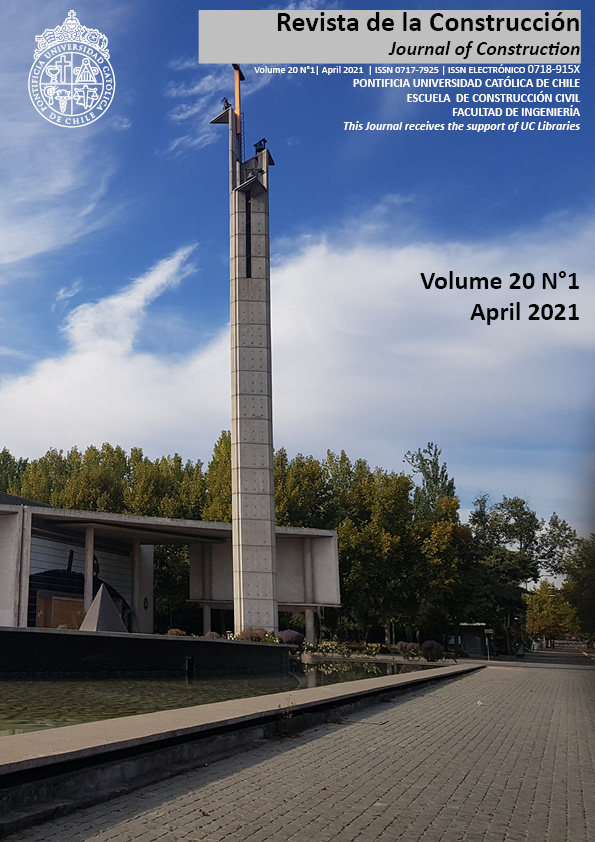Performance of ambient and freezing-thawing cured metazeolite and slag based geopolymer composites against elevated temperatures
DOI:
https://doi.org/10.7764/RDLC.20.1.145Keywords:
metazeolite, slag, polyvinyl alcohol fiber, basalt fiber, freezing-thawing, high-temperature, geopolymerAbstract
Today, geopolymer has an important place in producing sustainable alternative products by consuming less energy. This paper researches the elevated-temperature behavior of metazeolite (MZ) and slag (S) based geopolymer composites, reinforced by polyvinyl alcohol fiber (PVA) (at 0.3%, 0.6% and 0.9% by volume), and basalt fiber (B) (at 0.3%, 0.6% and 0.9% by volume). The curing was carried out at room temperature for up to 7 days and then the freeze-thaw test was applied as a curing method for up to 28 days. Slag was used alongside metazeolite to solve the problem of delayed setting time with its high Ca content. After 7 days, the damp environment provided by the freeze-thaw curing ensured the preservation of the compact structure and the continuation of geopolymerization. The resulting geopolymer composites were exposed to temperatures of 250, 500, and 750 oC. The flexural and compressive strengths, microstructure (FT-IR, XRD, SEM, TGA-DTA, and micro-CT analyzes), ultrasonic pulse velocity (UPV), visual inspection, and weight-losses of the geopolymers were examined to evaluate their behavior. According to the results, it was observed that geopolymer samples maintained their stability after 750oC. In this way, a sustainable geopolymer composite was produced by using less energy.
Downloads
References
Al-mashhadani, M. M., Canpolat, O., Aygörmez, Y., Uysal, M., & Erdem, S. (2018). Mechanical and microstructural characterization of fiber reinforced fly ash based geopolymer composites. Construction and Building Materials, 167, 505-513. https://doi.org/10.1016/j.conbuildmat.2018.02.061
Ali, N., Canpolat, O., Aygörmez, Y., & Al-Mashhadani, M. M. (2020). Evaluation of the 12–24 mm basalt fibers and boron waste on reinforced metakaolin-based geopolymer. Construction and Building Materials, 251, 118976. https://doi.org/10.1016/j.conbuildmat.2020.118976
Amuthakkannan, P., Manikandan, V., Winowlin Jappes, J. T., & Uthayakumar, M. (2013). Effect of fibre length and fibre content on mechanical properties of short basalt fibre reinforced polymer matrix composites. Materials Physics and Mechanics, 16(2), 107–117.
Arslan, A. A., Uysal, M., Yılmaz, A., Al-mashhadani, M. M., Canpolat, O., Şahin, F., & Aygörmez, Y. (2019). Influence of wetting-drying curing system on the performance of fiber reinforced metakaolin-based geopolymer composites. Construction and Building Materials, 225, 909–926. https://doi.org/10.1016/j.conbuildmat.2019.07.235
Assaedi, H., Alomayri, T., Shaikh, F. U. A., & Low, I. M. (2015). Characterisation of mechanical and thermal properties in flax fabric reinforced geopolymer composites. Journal of Advanced Ceramics, 4(4), 272–281. https://doi.org/10.1007/s40145-015-0161-1
Aygörmez, Y., Canpolat, O., & Al-mashhadani, M. M. (2020a). A survey on one year strength performance of reinforced geopolymer composites. Construction and Building Materials, 264, 120267. https://doi.org/10.1016/j.conbuildmat.2020.120267
Aygörmez, Y., Canpolat, O., & Al-mashhadani, M. M. (2020b). Assessment of geopolymer composites durability at one year age. Journal of Building Engineering, 32, 101453. https://doi.org/10.1016/j.jobe.2020.101453
Aygörmez, Y., Canpolat, O., Al-mashhadani, M. M., & Uysal, M. (2020). Elevated temperature, freezing-thawing and wetting-drying effects on polypropylene fiber reinforced metakaolin based geopolymer composites. Construction and Building Materials, 235. https://doi.org/10.1016/j.conbuildmat.2019.117502
Barbosa, V. F. F., & MacKenzie, K. J. D. (2003). Thermal behaviour of inorganic geopolymers and composites derived from sodium polysialate. Materials Research Bulletin, 38(2), 319–331. https://doi.org/10.1016/S0025-5408(02)01022-X
Bhushan H. Shinde, & Dr. Kshitija N. Kadam. (2015). Properties of Fly Ash based Geopolymer Mortar. International Journal of Engineering Research And, 4(7), 203–206. https://doi.org/10.17577/ijertv4is070750
Billong, N., Kinuthia, J., Oti, J., & Melo, U. C. (2018). Performance of sodium silicate free geopolymers from metakaolin (MK) and Rice Husk Ash (RHA): Effect on tensile strength and microstructure. Construction and Building Materials, 189, 307–313. https://doi.org/10.1016/j.conbuildmat.2018.09.001
Bingöl, Ş., Bilim, C., Atiş, C. D., & Durak, U. (2020). Durability Properties of Geopolymer Mortars Containing Slag. Iranian Journal of Science and Technology - Transactions of Civil Engineering, 44(Supppl 1), 561–569. https://doi.org/10.1007/s40996-019-00337-0
Burciaga-Díaz, O., Gómez-Zamorano, L. Y., & Escalante-García, J. I. (2016). Influence of the long term curing temperature on the hydration of alkaline binders of blast furnace slag-metakaolin. Construction and Building Materials, 113, 917–926. https://doi.org/10.1016/j.conbuildmat.2016.03.111
Celik, A., Yilmaz, K., Canpolat, O., Al-mashhadani, M. M., Aygörmez, Y., & Uysal, M. (2018). High-temperature behavior and mechanical characteristics of boron waste additive metakaolin based geopolymer composites reinforced with synthetic fibers. Construction and Building Materials, 187, 1190–1203. https://doi.org/10.1016/j.conbuildmat.2018.08.062
Cheng, T. W., & Chiu, J. P. (2003). Fire-resistant geopolymer produce by granulated blast furnace slag. Minerals Engineering, 16(3), 205–210. https://doi.org/10.1016/S0892-6875(03)00008-6
Davidovits, J., & Sawyer, J. L. (1985). U.S. Patent No. 4,509,985. Washington, DC: U.S. Patent and Trademark Office.
Davidovits, J. (2008). Geopolymer Chemistry and Applications, 5th edition. Saint-Quentin, France: Joseph Davidovits (Issue January 2008). Available on: https://www.researchgate.net/publication/265076752
Degirmenci, F. N. (2018). Freeze-Thaw and fire resistance of geopolymer mortar based on natural and waste pozzolans. Ceramics - Silikaty, 62(1), 41–49. https://doi.org/10.13168/cs.2017.0043
Dias, D. P., & Thaumaturgo, C. (2005). Fracture toughness of geopolymeric concretes reinforced with basalt fibers. Cement and Concrete Composites, 27(1), 49–54. https://doi.org/10.1016/j.cemconcomp.2004.02.044
Dombrowski, K., Buchwald, A., & Weil, M. (2007). The influence of calcium content on the structure and thermal performance of fly ash based geopolymers. Journal of Materials Science, 42(9), 3033–3043. https://doi.org/10.1007/s10853-006-0532-7
Duan, P., Yan, C., & Zhou, W. (2017). Compressive strength and microstructure of fly ash based geopolymer blended with silica fume under thermal cycle. Cement and Concrete Composites, 78, 108–119. https://doi.org/10.1016/j.cemconcomp.2017.01.009
Duxson, P., Fernández-Jiménez, A., Provis, J. L., Lukey, G. C., Palomo, A., & Van Deventer, J. S. J. (2007). Geopolymer technology: The current state of the art. Journal of Materials Science, 42(9), 2917–2933. https://doi.org/10.1007/s10853-006-0637-z
Gomez-Zamorano, L. Y., Vega-Cordero, E., & Struble, L. (2016). Composite geopolymers of metakaolin and geothermal nanosilica waste. Construction and Building Materials, 115, 269–276. https://doi.org/10.1016/j.conbuildmat.2016.03.002
Heah, C. Y., Kamarudin, H., Mustafa Al Bakri, A. M., Binhussain, M., Luqman, M., Khairul Nizar, I., Ruzaidi, C. M., & Liew, Y. M. (2011). Effect of curing profile on kaolin-based geopolymers. Physics Procedia, 22, 305–311. https://doi.org/10.1016/j.phpro.2011.11.048
Jalilifar, H., Sajedi, F., & Toosi, V. R. (2020). Evaluating the durability of recycled concrete made of coarse recycled aggregate concrete containing silica-fume and natural zeolite. Revista de La Construccion, 19(3), 457–473. https://doi.org/10.7764/RDLC.19.3.457
Jaya, N. A., Yun-Ming, L., Cheng-Yong, H., Abdullah, M. M. A. B., & Hussin, K. (2020). Correlation between pore structure, compressive strength and thermal conductivity of porous metakaolin geopolymer. Construction and Building Materials, 247, 118641. https://doi.org/10.1016/j.conbuildmat.2020.118641
Jiang, X., Xiao, R., Zhang, M., Hu, W., Bai, Y., & Huang, B. (2020). A laboratory investigation of steel to fly ash-based geopolymer paste bonding behavior after exposure to elevated temperatures. Construction and Building Materials, 254, 119267. https://doi.org/10.1016/j.conbuildmat.2020.119267
Lahoti, M., Wong, K. K., Yang, E. H., & Tan, K. H. (2018). Effects of Si/Al molar ratio on strength endurance and volume stability of metakaolin geopolymers subject to elevated temperature. Ceramics International, 44(5), 5726–5734. https://doi.org/10.1016/j.ceramint.2017.12.226
Masi, G., Rickard, W. D. A., Bignozzi, M. C., & Van Riessen, A. (2015). The effect of organic and inorganic fibres on the mechanical and thermal properties of aluminate activated geopolymers. Composites Part B: Engineering, 76, 218–228. https://doi.org/10.1016/j.compositesb.2015.02.023
Nasr, D., Pakshir, A. H., & Ghayour, H. (2018). The influence of curing conditions and alkaline activator concentration on elevated temperature behavior of alkali activated slag (AAS) mortars. Construction and Building Materials, 190, 108–119. https://doi.org/10.1016/j.conbuildmat.2018.09.099
Nikolov, A., Rostovsky, I., Nugteren, H. (2017). Natural and calcined zeolite (metazeolite) based geopolymers. BULGARIAN GEOLOGICAL SOCIETY, National Conference with International Participation “GEOSCIENCES 2017,” Sofía, Bulgaria, January, 31–32. Available on: https://www.researchgate.net/publication/321769385_Natural_and_calcined_zeolite_metazeolite_based_geopolymers_Geopolimeri_na_osnovata_na_priroden_i_kalciniran_zeolit_metazeolit/citations
Nikolov, A., Nugteren, H., & Rostovsky, I. (2020). Optimization of geopolymers based on natural zeolite clinoptilolite by calcination and use of aluminate activators. Construction and Building Materials, 243, 118257. https://doi.org/10.1016/j.conbuildmat.2020.118257
Nikolov, A., & Rostovsky, I. (2017). Sodium-silicate geopolymers based on natural zeolite – clinoptilolite. Comptes Rendus de L’Academie Bulgare Des Sciences, 70(12), 1655–1662.
Özen, S., & Alam, B. (2018). Compressive strength and microstructural characteristics of natural zeolite-based geopolymer. Periodica Polytechnica Civil Engineering, 62(1), 64–71. https://doi.org/10.3311/PPci.10848
Pan, Z., Tao, Z., Murphy, T., & Wuhrer, R. (2017). High temperature performance of mortars containing fine glass powders. Journal of Cleaner Production, 162, 16–26. https://doi.org/10.1016/j.jclepro.2017.06.003
Provis, J. L. (2014). Geopolymers and other alkali activated materials: Why, how, and what? Materials and Structures/Materiaux et Constructions, 47(1–2), 11–25. https://doi.org/10.1617/s11527-013-0211-5
Puertas, F., Amat, T., Fernández-Jiménez, A., & Vázquez, T. (2003). Mechanical and durable behaviour of alkaline cement mortars reinforced with polypropylene fibres. Cement and Concrete Research, 33(12), 2031–2036. https://doi.org/10.1016/S0008-8846(03)00222-9
Ranjbar, N., & Zhang, M. (2020). Fiber-reinforced geopolymer composites: A review. Cement and Concrete Composites, 107, 103498. https://doi.org/10.1016/j.cemconcomp.2019.103498
Rashad, A. M. (2015). An exploratory study on sodium sulphate-activated slag blended with Portland cement under the effect of thermal loads. Journal of Thermal Analysis and Calorimetry, 119(3), 1535–1545. https://doi.org/10.1007/s10973-014-4345-7
Rashad, A. M. (2020). An investigation on alkali-activated slag pastes containing quartz powder subjected to elevated temperatures. Revista de La Construcción, 2015, 42–51. https://doi.org/10.7764/rdlc.19.1.42-51
Rashad, A. M., Zeedan, S. R., & Hassan, A. A. (2016). Influence of the activator concentration of sodium silicate on the thermal properties of alkali-activated slag pastes. Construction and Building Materials, 102, 811–820. https://doi.org/10.1016/j.conbuildmat.2015.11.023
Rivera, J. F., De Gutierrez, R. M., Mejia, J. M., & Gordillo, M. (2014). Hybrid cement based on the alkali activation of by-products of coal. Revista de La Construccion, 13(2), 31–39. https://doi.org/10.4067/s0718-915x2014000200004
Rocha, T. da S., Dias, D. P., França, F. C. C., Guerra, R. R. de S., & Marques, L. R. da C. de O. (2018). Metakaolin-based geopolymer mortars with different alkaline activators (Na+ and K+). Construction and Building Materials, 178, 453–461. https://doi.org/10.1016/j.conbuildmat.2018.05.172
Rovnaník, P. (2010). Effect of curing temperature on the development of hard structure of metakaolin-based geopolymer. Construction and Building Materials, 24(7), 1176–1183. https://doi.org/10.1016/j.conbuildmat.2009.12.023
Sahmaran, M., Lachemi, M., & Li, V. C. (2011). Assessing Mechanical Properties and Microstructure of Fire-Damaged Engineered Cementitious Composites. ACI Materials Journal, 107(3), 297–304.
Sarker, P. K., & McBeath, S. (2015). Fire endurance of steel reinforced fly ash geopolymer concrete elements. Construction and Building Materials, 90, 91–98. https://doi.org/10.1016/j.conbuildmat.2015.04.054
Shaikh, F. U. A., & Vimonsatit, V. (2015). Compressive strength of fly‐ash‐based geopolymer concrete at elevated temperatures. Fire and materials, 39(2), 174-188.
Si, R., Guo, S., Dai, Q., & Wang, J. (2020). Atomic-structure, microstructure and mechanical properties of glass powder modified metakaolin-based geopolymer. Construction and Building Materials, 254, 119303. https://doi.org/10.1016/j.conbuildmat.2020.119303
Sim, J., Park, C., & Moon, D. Y. (2005). Characteristics of basalt fiber as a strengthening material for concrete structures. Composites Part B: Engineering, 36(6–7), 504–512. https://doi.org/10.1016/j.compositesb.2005.02.002
Tanyildizi, H., & Yonar, Y. (2016). Mechanical properties of geopolymer concrete containing polyvinyl alcohol fiber exposed to high temperature. Construction and Building Materials, 126, 381–387. https://doi.org/10.1016/j.conbuildmat.2016.09.001
Topçu, I. B., & Karakurt, C. (2008). Properties of reinforced concrete steel rebars exposed to high temperatures. Advances in Materials Science and Engineering, 2008, 1-4. https://doi.org/10.1155/2008/814137
Türker, H. T., Balçikanli, M., Durmuş, I. H., Özbay, E., & Erdemir, M. (2016). Microstructural alteration of alkali activated slag mortars depend on exposed high temperature level. Construction and Building Materials, 104, 169–180. https://doi.org/10.1016/j.conbuildmat.2015.12.070
Uysal, M., Al-mashhadani, M. M., Aygörmez, Y., & Canpolat, O. (2018). Effect of using colemanite waste and silica fume as partial replacement on the performance of metakaolin-based geopolymer mortars. Construction and Building Materials, 176. https://doi.org/10.1016/j.conbuildmat.2018.05.034
Valencia Saavedra, W. G., & Mejía de Gutiérrez, R. (2017). Performance of geopolymer concrete composed of fly ash after exposure to elevated temperatures. Construction and Building Materials, 154, 229–235. https://doi.org/10.1016/j.conbuildmat.2017.07.208
Xu, F., Deng, X., Peng, C., Zhu, J., & Chen, J. (2017). Mix design and flexural toughness of PVA fiber reinforced fly ash-geopolymer composites. Construction and Building Materials, 150, 179–189. https://doi.org/10.1016/j.conbuildmat.2017.05.172
Yunsheng, Z., Wei, S., Zongjin, L., Xiangming, Z., Eddie, & Chungkong, C. (2008). Impact properties of geopolymer based extrudates incorporated with fly ash and PVA short fiber. Construction and Building Materials, 22(3), 370–383. https://doi.org/10.1016/j.conbuildmat.2006.08.006
Zhang, H. Y., Kodur, V., Wu, B., Cao, L., & Wang, F. (2016). Thermal behavior and mechanical properties of geopolymer mortar after exposure to elevated temperatures. Construction and Building Materials, 109, 17–24. https://doi.org/10.1016/j.conbuildmat.2016.01.043
Zhang, Y. J., Li, S., Wang, Y. C., & Xu, D. L. (2012). Microstructural and strength evolutions of geopolymer composite reinforced by resin exposed to elevated temperature. Journal of Non-Crystalline Solids, 358(3), 620–624. https://doi.org/10.1016/j.jnoncrysol.2011.11.006





